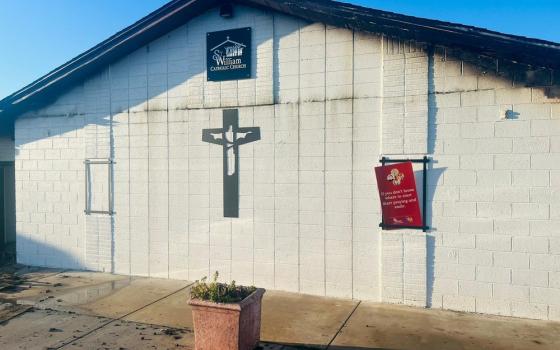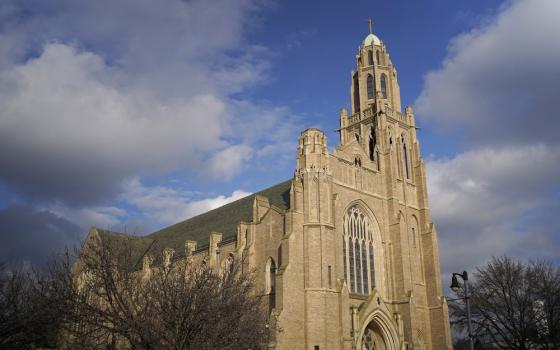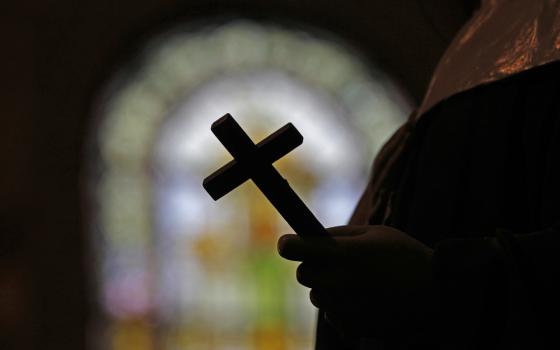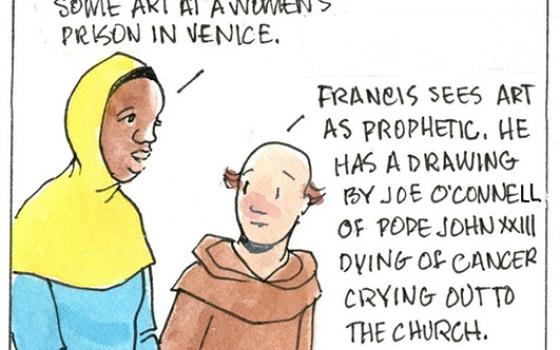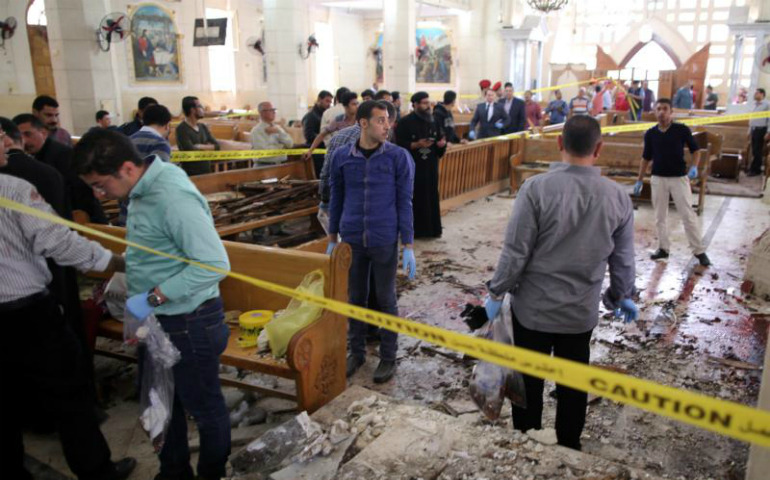
Security personnel investigate the scene of a bomb explosion April 9 inside the Orthodox Church of St. George in Tanta, Egypt. That same day an explosion went off outside the Cathedral of St. Mark in Alexandria where Coptic Orthodox Pope Tawadros II was presiding over the Palm Sunday service. (CNS photo/Khaled Elfiqi, EPA)
Despite recent and repeated terrorist attacks against Egypt's minority Christian communities, Pope Francis will not cancel his visit to Egypt.
"The pope's trip to Egypt proceeds as scheduled," Greg Burke, Vatican spokesman, told Catholic News Service by email April 10. The pope is scheduled to meet governmental and interfaith leaders during an April 28-29 visit to Cairo.
"Egyptians are looking forward to Pope Francis' visit, although the atmosphere at present is heavy," Fr. Rafic Grieche, spokesman for the Egyptian bishops, told CNS April 10, the day after the attacks.
"The pope's mission is to be beside his brothers at the time of difficulty. Now is the real time that he can bring peace and hope to the Egyptian people as a whole and to the Christians of the East, in particular," Grieche added.
He said people were uneasy entering churches with metal detectors and other security measures.
"It's not like going to a normal church. But we need these measures to keep people safe," he said.
He said after the attack, he celebrated a Mass with 2,000 people.
"The people knew already about the attack in Tanta, but they did not want to be afraid. In the evening, they also came for the prayers of the Holy Week," Grieche said.
Coptic Orthodox Pope Tawadros II was in the Cathedral of St. Mark in Alexandria April 9 for the Palm Sunday service, when an explosion went off outside the church. Security footage appeared to show a security officer direct a man who was seeking entry into the cathedral to go through a metal detector. The man took a step under the detector then backed up a step, followed by a huge explosion that cut off the camera feed.
Earlier, a bomb exploded 70 miles away inside the Church of St. George in Tanta, 50 miles north of Cairo, during its Palm Sunday service. Estimates say at least 44 people were killed and more than 100 injured in the two attacks, making it one of the deadliest against the nation's Christians in decades.
It was the single deadliest day for Christians in decades and the worst since a bombing at a Cairo church in December killed 30 people.
Tawadros told the Italian national network Rai News April 9 the attacks would "not damage the unity and cohesiveness" of the Egyptian people.
"Egyptians are united before this terrorism," he said, adding that "these vile attacks that hit people of peace in places of prayer demonstrate that terrorism lacks any religion."
Sheik Ahmad el-Tayeb, grand imam of al-Azhar University, also condemned the attacks, calling them a "despicable terrorist bombing that targeted the lives of innocents."
Retired Coptic Catholic Bishop Antonios Mina of Giza, Egypt, said the incidents were an attack against the nation's unity, its Coptic Christians, "to remind them that they have no rights, and against all Christian minorities of the country that anxiously await Pope Francis."
"Despite it all, we will never lose hope. These atrocious gestures make us firmer in the faith and stronger," he said. "Egypt's Christians are warriors of hope."
One Catholic leader highlighted his country's failure to address the real causes behind the Palm Sunday massacres.
Speaking to "the officials and the wise of this country," Coptic Catholic Bishop Botros Fahim Awad Hanna of Minya said that "you don't fight terrorism with words or slogans, nor with security or armies alone."
"What have you done for social, economic, health, political and human justice? What have you done for the poor and downtrodden? What have you done to reform thought, expression and religious discourse?"
In a posting on his Facebook page, Fahim said that when Francis goes to Cairo, he "will come to say no to terrorism and evil, and yes to goodness and fraternity. Love will never fail."
Around the world, religious leaders offered prayers.
Cardinal Daniel DiNardo, president of the U.S. Conference of Catholic Bishops, said the attacks on the churches were "unspeakable persecution."
"In the midst of what should be peace, horrible violence yet again," he said. On behalf of all U.S. bishops, the cardinal expressed "our deepest sadness" for all those killed and injured, and their loved ones.
"I also express our solidarity with the Coptic church in Egypt, an ancient Christian community that faces mounting persecution in its historic home from violent extremism. I also pray for the nation of Egypt, that it may seek justice, find healing, and strengthen protection for Coptic Christians and other religious minorities who wish only to live in peace."
Egypt is 90 percent Sunni Muslim; Christians make up the remaining 10 percent, with that majority being the Coptic Orthodox church. The Catholic community in Egypt numbers about 272,000, less than 0.5 percent of the population.




